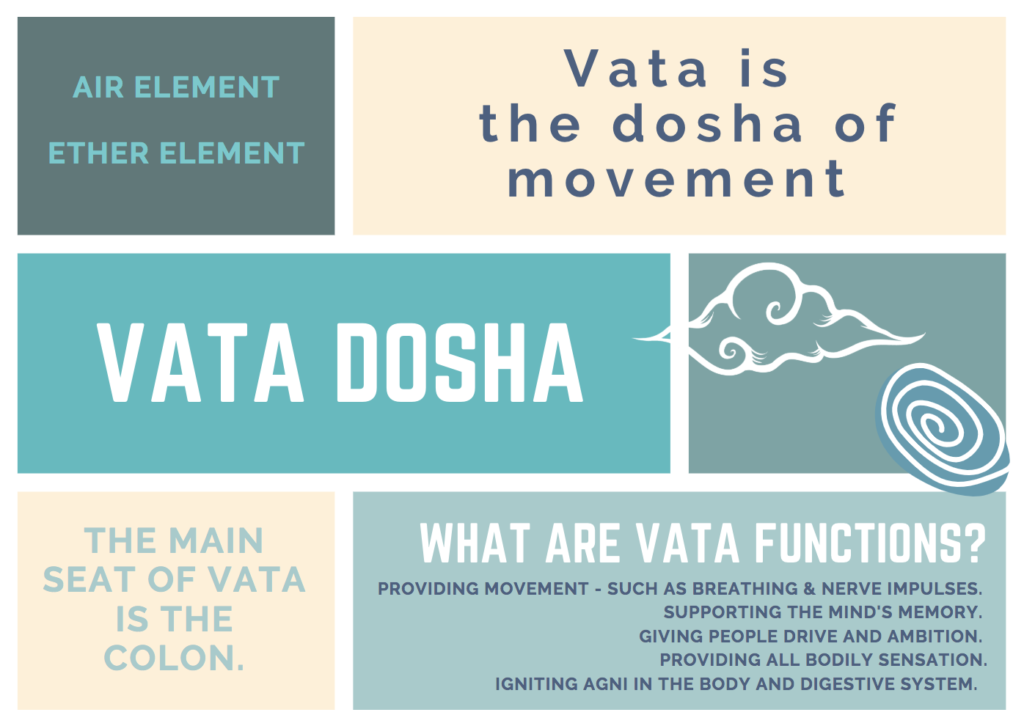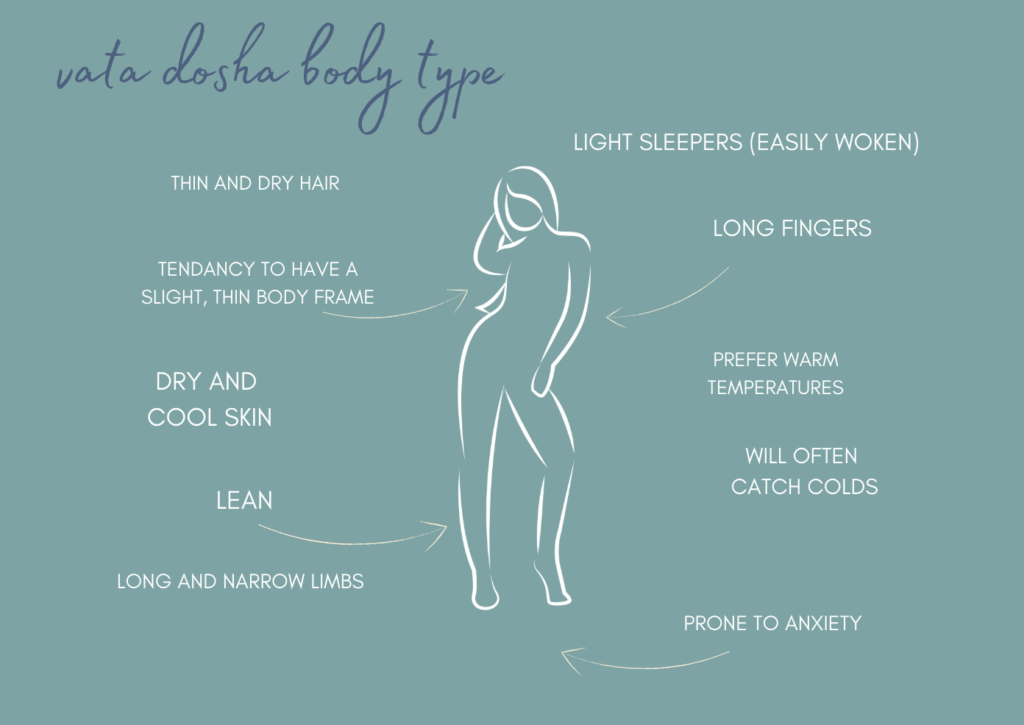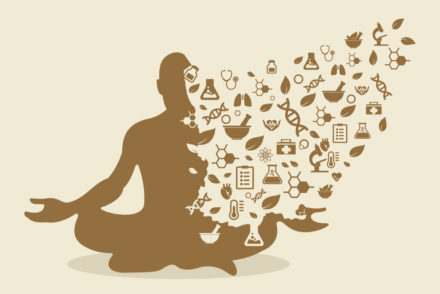Are you looking for an in-depth guide to the vata dosha body type? This blog post goes through the different functions of the vata dosha, as well as the personality and emotional traits, and the physical body traits too.
Vata dosha is the resulting combination of air and space elements. The nature of this creative energy represents light, moving, cool, dry, irregular, rough, and clear qualities of air and space. Vata dosha is the primary force behind all kinds of movement and communication in the body.
Think of Vata as currents in the body. Without these currents, one part of the body will not be able to communicate with the other, and since organs are interdependent on one another, the whole system will fail. Without Vata, our hearts will not beat, blood will not flow, and our brain will have no control over other organs.
So what physiological functions are ruled by Vata, what are the physical and psychological characteristics of Vata-dominated people, what makes this dosha go out of balance, and what happens when it goes out of balance? Keep on reading to find everything you need to know about Vata dosha.
The functions of Vata dosha in the body
All physiological functions that require mobility and communication like respiration, nutrient transfer, blood circulation, excretion, working of the brain, neural communications, working of five senses are performed by Vata dosha. It provides clear senses, congestion-free breathing, complete and consistent elimination, clarity of speech, creativity, and maintains proper blood circulation in the body.

Physical characteristics of Vata body type
Vata-dominated people have a narrow body frame, small structure, weaker muscles, and delicate body types as they have lots of air and space in their constitution. Vata dosha body types are known to have a slim build, often being described as ‘thin’ or ‘lean’ by their friends and family. The vata body type is also common in athletic bodies.
People with Vata dominated dosha tend to face all kinds of irregularity throughout their lives – irregular appetite, irregular temperament, irregular sleep, irregular menstruation, irregular bowel movements, a swing between constipation and diarrhea, and likewise alternating opposite conditions. This irregularity can even (at times) overlap into their personality traits too (which we’ll discuss later).

Vata individuals have a slightly colder body temperature than people of other doshas. Besides, they exhibit a general intolerance towards cold weather and foods. They will often be the people who ask fromt he heating to be turned on – or who always wear a jumper!
Their skin and hair resemble the qualities of air and space, that is often dry, rough, and brittle. The quick and moving qualities of Vata dosha provides them with high energy, and they are generally very brisk in their physical activities. The light conditions of Vata dosha and an average appetite ensures that they find it very hard to gain weight and are generally slim.
These people have an average metabolism and an average lifespan that lies somewhere between Pitta and Kapha. Vata has a generally poor immunity against diseases and illness, so they may often find themselves coming down with infections or colds during the winter months. They prefer an active lifestyle but sleep less than people of other doshas. Moreover, they are usually very light sleepers.
Generally the characteristics of someone with a vata dosha body type are:
- Thin hair
- Dry hair (not greasy)
- Thin, dry and cool skin
- Slim body frame (they find it easy to stay slim, and hard to gain weight)
- Lean muscles
- Delicate joints (often prone to cracking noises)
- Long and narrow limbs
- Prefers warm temperatures (is adverse to colder climates)
- Easily disturbed when sleeping
Emotional and mental characteristics of Vata dosha
Vata dosha is known to make creative minds and original thinkers. They have a quick grasping power as they learn things very quickly. However, a poor memory negates some of the benefits of their exceptional learning skills. Their friends find them very easy-going, friendly, witty, enthusiastic, and always willing to learn.
Their temperament is that of irregularity and uncertainty. Vata people have a fairly decent amount of control over their anger, however, not as much as Kapha. Because of their moving and unstable nature, Vata people get easily bored and lose interest in things they once started with enthusiasm. They show a general inclination towards a nomadic lifestyle and do not like to settle.
Here are some of the main emotional and personality traits of the Vata dosha body type:
- Creative and inventive
- A great ability to adapt to change
- Quick and adaptive
- Emotionally sensItive and in-touch with emotions
- Quick learn
- Quick to understand instructions
- Prone to being nervous or anxious
- Perceptive to both sound and touch

When the Vata body type is out of balance
When experiencing an imbalance, Vata individuals feel restless and tend to immerse themselves in excessive physical activity. Constipation is a common problem faced by them. In cold weather, they find it increasingly hard to keep their skin properly hydrated. As an imbalance also means poor circulation and communication, they face muscle spasms, joint pain, difficulty in breathing, asthma, and other respiratory difficulties. An excessive movement can also manifest as difficulty in falling asleep.
A imbalance of Vata manifests itself as anxiety, fear, worry, and nervousness. Their ability to think clearly gets affected, and they find it even more difficult to remember things. They may also face stress and insomnia as a result of excessive mental activity.
Eating habits for the Vata dosha body type
Ayurveda is all about learning about your body in depth and understanding the constitution of your body – in order to give your body what it needs. With this in mind, you’ll be aaware by now, that different dosha contitution will need different kinds of food and different dietary requirments.
For the people who are Vata dosha dominant, their dosha means they are prone to being cold, dry and rough (often reflected in their hair, nails and skin). To create the healthy balance that Ayurveda strives for – a person of Vata dosha, should focus on consuming warm, cooked, easy-to-digest foods. This gives the Vata dosha the balance they need. The warm food helps their body feel warm, and the easy-to-digest food means that their energy can be spent elsewhere (where it is more needed).
It’s also important for the vata dosha to eat regularly and try to keep their eating to a schedule. Often, people with the vata dosha find themselves forgetting to eat (which can lead to digestive issues, low immunity and low energy), so it’s key to ensure you remember to eat, and keep regular meal slots in your routine throughout the day.




